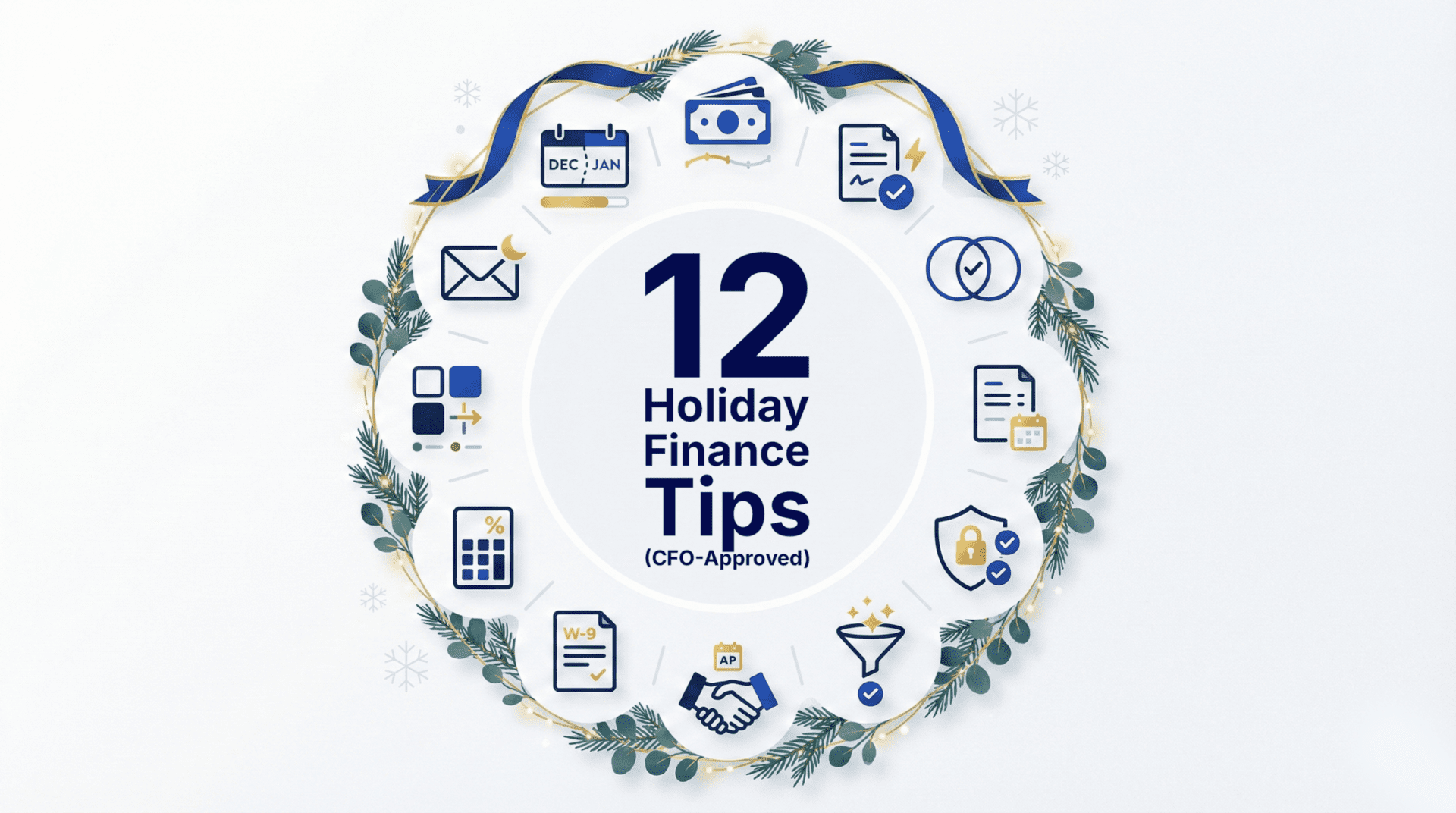
Outsourced CFO services for startups are becoming a popular choice for many new businesses. Instead of hiring a full-time Chief Financial Officer, startups can tap into the expertise of an outsourced CFO. This approach can save money and bring in valuable skills without the long-term commitment. In this article, we’ll explore what these services include, their benefits, costs, and how to find the right CFO for your startup.
Key Takeaways
- Outsourced CFO services can save startups money compared to hiring a full-time CFO.
- They provide access to financial expertise that many startups lack in-house.
- Startups can focus more on their core business while the CFO handles finances.
- Costs can vary based on the services needed and the CFO’s experience.
- Choosing the right CFO involves checking their experience and how well they fit with your company culture.
Understanding Outsourced CFO Services
What Is an Outsourced CFO?
Okay, so what’s the deal with outsourced CFOs? Basically, instead of hiring a full-time Chief Financial Officer, a company contracts with an external firm or individual to handle those responsibilities. Think of it as renting a CFO instead of buying one. This can be a really smart move, especially for startups or smaller businesses that don’t quite need a full-time executive but still need high-level financial guidance. They bring financial expertise without the commitment of a full-time salary and benefits package.
Key Responsibilities of an Outsourced CFO
What exactly does an outsourced CFO do? Well, a lot! It’s not just about balancing the books. Here’s a quick rundown:
- Financial Planning and Analysis: They help create budgets, forecast future performance, and analyze financial data to make informed decisions.
- Cash Flow Management: Keeping a close eye on the money coming in and going out to ensure the company has enough to operate.
- Strategic Financial Advice: Providing guidance on things like fundraising, mergers and acquisitions, and other major financial decisions.
- Risk Management: Identifying and mitigating financial risks to protect the company’s assets.
Outsourced CFOs are like financial superheroes. They swoop in, assess the situation, and provide the expertise needed to keep the company on track. They can also help with things like investor relations and compliance.
Differences Between In-House and Outsourced CFOs
So, what’s the real difference between having a CFO on staff versus hiring one from outside? It really boils down to cost, commitment, and control. An in-house CFO is a full-time employee, which means a higher salary, benefits, and a long-term commitment. You also have direct control over their day-to-day activities. An outsourced CFO, on the other hand, offers more flexibility and can be more cost-effective, especially in the early stages of a company. However, you might have less direct control and need to work harder to integrate them into your team. Here’s a quick comparison:
| Feature | In-House CFO | Outsourced CFO |
| Cost | Higher (salary, benefits, overhead) | Lower (hourly or project-based fees) |
| Commitment | Long-term | Flexible (contract-based) |
| Control | Direct | Less direct |
| Integration | Naturally integrated into the company culture | Requires effort to integrate into existing teams |
| Expertise | Focused on the company’s specific needs | Broader experience across different industries |
Benefits of Outsourced CFO Services for Startups
Cost-Effectiveness and Flexibility
For startups, money is always tight. Hiring a full-time CFO can be a huge expense, including salary, benefits, and office space. Outsourcing gives you the financial leadership you need without breaking the bank. You only pay for the services you use, when you need them. This flexibility is a game-changer, especially in the early stages when your needs might change quickly. It’s like having a CFO on demand, scaling up or down as your business evolves. You can allocate those saved resources to other critical areas like product development or marketing.
Access to Expertise and Experience
Startups often lack the deep financial knowledge needed to navigate complex issues. An outsourced CFO brings a wealth of experience from working with various companies, potentially including those in your industry. They can help with:
- Financial modeling and forecasting
- Fundraising and investor relations
- Strategic planning and decision-making
- Risk management
Having someone who’s “been there, done that” can prevent costly mistakes and accelerate your growth. They can also provide valuable insights into industry trends and best practices.
Focus on Core Business Functions
When founders spend too much time on financial tasks, it takes away from their ability to focus on what they do best: building the product and growing the business. Outsourcing the CFO role frees up your time and energy to concentrate on core functions like innovation, sales, and customer acquisition. Let the financial experts handle the numbers, so you can focus on essential strategies for your company’s success.
Evaluating the Costs of Outsourced CFO Services
Typical Pricing Models
Outsourced CFO services come with different pricing structures, and it’s important to understand them. The most common are hourly rates, fixed monthly fees, and value-based pricing. Hourly rates are pretty straightforward – you pay for the time the CFO spends on your business. Fixed monthly fees provide a predictable cost, covering a defined set of services. Value-based pricing ties the CFO’s compensation to specific outcomes or achievements, like increased profitability or successful fundraising. Choosing the right model depends on your budget, needs, and risk tolerance.
Factors Influencing Costs
Several things affect the cost of outsourced CFO services. The CFO’s experience and expertise play a big role – more experienced CFOs usually charge higher rates. The scope of services also matters; a full suite of services will cost more than just basic financial reporting. The complexity of your business and industry can also impact costs. For example, a startup in a highly regulated industry might require more specialized financial expertise, leading to higher fees. Location can also be a factor, with CFOs in major metropolitan areas often charging more.
Budgeting for CFO Services
Budgeting for outsourced CFO services requires careful planning. First, assess your current financial needs and identify the areas where a CFO can provide the most value. Get quotes from several providers to compare pricing and services. Don’t just focus on the lowest price; consider the CFO’s experience, expertise, and cultural fit. It’s also a good idea to include a buffer in your budget for unexpected expenses or additional services. Remember that part-time CFO services can be a significant investment, but the right CFO can help you achieve your financial goals.
When budgeting, consider the long-term benefits of having a skilled financial professional on your team. A good CFO can help you make better decisions, improve your financial performance, and ultimately increase the value of your business. This can lead to a return on investment that far outweighs the initial cost.
Here are some steps to help you budget:
- Define your financial needs and goals.
- Research and compare different CFO providers.
- Get detailed quotes and understand the pricing structure.
- Factor in potential additional costs.
- Regularly review your budget and adjust as needed.
Identifying the Right Outsourced CFO for Your Startup
Finding the right outsourced CFO is a big deal for your startup. It’s not just about the numbers; it’s about finding someone who gets your business and can help you grow. It’s like finding the right co-founder, but for finance.
Assessing Industry Experience
Industry experience matters. A lot. You don’t want someone learning on the job with your money. Look for a CFO who has worked with startups in your sector. They’ll understand the specific challenges and opportunities you face. For example, a SaaS company has very different financial needs than a biotech firm. It’s about finding someone who speaks your language and knows the landscape.
Evaluating Cultural Fit
Cultural fit is just as important as technical skills. Your outsourced CFO will be working closely with your team, so you need someone who meshes well with your company culture. Are they a good communicator? Do they share your values? Do they understand your vision? These are all important questions to ask. It’s about finding someone you trust and enjoy working with.
Understanding Service Offerings
What services do they actually provide? Some outsourced CFOs offer part-time services, while others are more full-service. Make sure their offerings align with your needs. Do they handle bookkeeping, financial modeling, fundraising support, or all of the above? Get a clear understanding of what’s included in their fees and what’s extra.
Choosing the right outsourced CFO is a critical decision. Take your time, do your research, and find someone who is the right fit for your startup. It can make all the difference in your company’s success.
Here’s a quick checklist to consider:
- Check references.
- Ask about their experience with similar companies.
- Understand their pricing model.
- Meet with them in person (or virtually) to assess cultural fit.
Common Challenges with Outsourced CFO Services
Outsourcing your CFO duties can be a game-changer, but it’s not without its potential bumps in the road. It’s important to be aware of these challenges upfront so you can plan and mitigate them effectively. Let’s look at some common issues.
Communication Barriers
One of the biggest hurdles can be communication. When your CFO isn’t in the office every day, staying on the same page requires extra effort. This isn’t just about scheduling regular meetings (though that’s important!). It’s about establishing clear communication channels and protocols from the start. Think about:
- How often will you have check-in calls?
- What’s the preferred method for urgent questions (email, phone, instant message)?
- Who is the point of contact on your team for the CFO?
It’s easy for misunderstandings to arise when you’re not face-to-face regularly. Make sure everyone is clear on expectations and responsibilities to avoid frustration down the line.
Integration with Existing Teams
Getting an outsourced CFO to mesh well with your existing team is essential. They need to work with your accounting staff, department heads, and even your CEO. This requires more than just technical skills; it requires strong interpersonal skills and a willingness to learn about your company culture. Consider these points:
- Introduce the outsourced CFO to the team early on.
- Encourage open communication and collaboration.
- Clearly define roles and responsibilities to avoid overlap or gaps.
Managing Expectations
It’s easy to have unrealistic expectations when you bring in an outsourced CFO. They’re not miracle workers, and they can’t solve all your financial problems overnight. It’s important to have a clear understanding of what they can and cannot do, and to set realistic goals. Think about:
- What are your specific goals for the outsourced CFO?
- What are the key performance indicators (KPIs) you’ll use to measure their success?
- How will you provide feedback and address any concerns?
Here’s a simple table to illustrate expectation management:
| Area | Realistic Expectation | Unrealistic Expectation |
| Timeframe | Gradual improvements over several months | Immediate, dramatic results within weeks |
| Problem Solving | Identifying and addressing key financial issues | Solving all financial problems instantly |
| Availability | Regular communication and scheduled meetings | 24/7 on-call availability for every minor issue |
Maximizing the Value of Your Outsourced CFO
So, you’ve taken the plunge and hired an outsourced CFO. Great! But simply having one isn’t enough. You need to actively work to get the most out of the relationship. It’s like planting a tree – you can’t just stick it in the ground and expect it to thrive. You need to water it, give it sunlight, and protect it from pests. Same goes for your CFO.
Setting Clear Goals and Objectives
First things first: what do you actually want to achieve? Don’t just say “improve our finances.” Get specific. Do you want to reduce costs by 15%? Increase revenue by 20%? Secure a new round of funding? The more specific you are, the better your CFO can tailor their work to meet your needs.
- Define Key Performance Indicators (KPIs) that align with your business goals.
- Establish a timeline for achieving these goals.
- Regularly review and adjust your goals as needed.
Regular Performance Reviews
Don’t wait until the end of the year to check in. Schedule regular performance reviews – monthly or quarterly – to discuss progress, address any concerns, and make sure everyone’s on the same page. These reviews aren’t just about holding your CFO accountable; they’re also an opportunity for you to provide feedback and help them better understand your business.
Think of these reviews as a two-way street. It’s a chance for you to share your perspective and for your CFO to share theirs. Open communication is key to a successful partnership.
Building a Strong Partnership
Your outsourced CFO shouldn’t just be a vendor; they should be a trusted advisor and a part of your team. Treat them with respect, involve them in important decisions, and be open to their ideas. The more you treat them like a true partner, the more invested they’ll be in your success. This means sharing information freely, being responsive to their questions, and valuing their input. It’s about creating a collaborative environment where everyone feels comfortable sharing their thoughts and ideas. This is how you really maximize the value.
Future Trends in Outsourced CFO Services
Technological Advancements
Technology is changing everything, and outsourced CFO services are no exception. We’re seeing more and more automation in accounting and finance, which means outsourced CFOs can handle routine tasks more efficiently. This frees them up to focus on higher-level strategic work. Think about things like AI-powered forecasting and real-time data analytics. These tools give businesses better insights into their financial performance and help them make smarter decisions. It’s not just about crunching numbers anymore; it’s about using technology to gain a competitive edge. An outsourced CFO with expertise in scenario modeling can assist businesses in forecasting future possibilities and encourage innovative thinking within their teams.
Evolving Roles in Financial Management
The role of the CFO is changing. It’s not just about being a bean counter anymore. CFOs are becoming more strategic advisors, helping businesses navigate complex challenges and opportunities. This is especially true for outsourced CFOs, who often bring a fresh perspective and a wide range of experience to the table. They’re expected to be more proactive, identifying potential risks and opportunities before they become major issues.
- Strategic planning and execution
- Risk management and compliance
- Technology adoption and integration
Impact of Remote Work on CFO Services
Remote work has become the new normal for many businesses, and this has had a big impact on outsourced CFO services. It’s now easier than ever to work with a CFO who is located anywhere in the world. This gives businesses access to a wider pool of talent and expertise. However, it also means that communication and collaboration are more important than ever. Outsourced CFOs need to be able to work effectively with remote teams and use technology to stay connected.
The rise of remote work has made it easier for businesses to access outsourced CFO services, but it has also created new challenges. Businesses need to make sure they have the right technology and processes in place to support remote collaboration and communication. It’s all about finding the right balance between flexibility and control.
Here’s a quick look at how remote work is changing the game:
| Feature | Traditional CFO | Outsourced CFO (Remote) |
| Location | On-site | Anywhere |
| Communication | In-person | Virtual |
| Collaboration | Physical | Digital |
| Technology Focus | Basic | Advanced |
Wrapping It Up
In the end, outsourced CFO services can really help your business. They bring in skills and knowledge that might be missing in-house, and they can save you money too. Sure, there are costs involved, but when you weigh that against the benefits, it often makes sense. If your business is looking for a CFO, we can help place the right person. Book a call to discuss your options here.
Frequently Asked Questions
What is an outsourced CFO?
An outsourced CFO is a financial expert who helps businesses manage their finances but is not a full-time employee. They provide advice and support on financial matters.
What are the main tasks of an outsourced CFO?
An outsourced CFO helps with budgeting, financial planning, cash flow management, and making sure the business follows financial rules. They also help with reports and strategies.
How is an outsourced CFO different from an in-house CFO?
An in-house CFO works directly for the company and is a permanent staff member. An outsourced CFO is hired from outside the company, often for a specific time or project.
What are the advantages of hiring an outsourced CFO for a startup?
Outsourced CFOs can save money and offer expert help without needing a full-time salary. They let business owners focus on running their company instead of worrying about finances.
What should I consider when choosing an outsourced CFO?
Look for someone who knows your industry, fits well with your team, and offers the services you need. It’s important to find a good match for your business.
What challenges might I face with an outsourced CFO?
You might have trouble communicating clearly, getting them to work well with your current team, or making sure your financial goals are understood and met.
The Clever Writing Team
The CleverProfits writing team includes various team members in Advisory, Financial Strategy, Tax, and Leadership. Our goal is to provide relevant and easy-to-understand financial content to help founders and business leaders reach their true potential.






